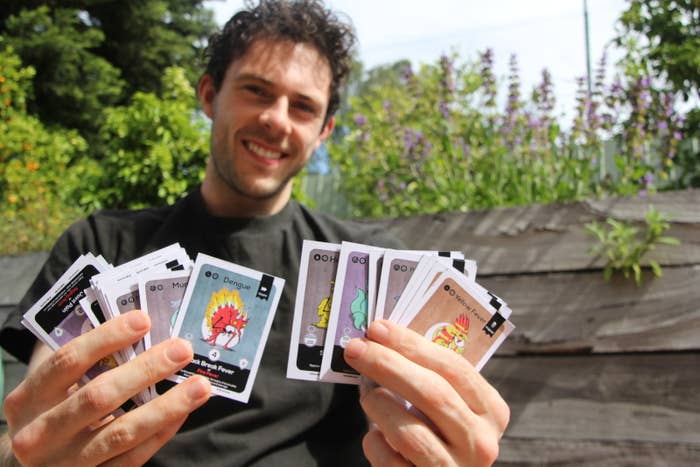
The Royal Australian College of General Practitioners' (RACGP) registrar of the year Dr Daniel Epstein initially wanted a career in emergency departments, but actually spending time in ER changed his mind about where he thought he could best help people.
"You kind of see patients one at a time and you're treating them when they're sick and they've got disease," the 27-year-old told BuzzFeed News. "And I kept thinking as a doctor and on a broader scale, the biggest impact you can have is preventing these things from happening in the first place, rather than treating them when they happen."
Since then Epstein, who is based in Victoria's Yarra Valley, has been focusing more on preventative health and working towards becoming a general practitioner, while also researching how people can get the most out of their GP.
Epstein's first big foray into preventative health came through Vaxcards, a collectable card battle game for kids getting vaccinations from their GP, which he co-founded with a friend. Kids collect cards once they get each vaccination and then can battle those cards against each other.
Epstein said it helped make the experience about more than just receiving an injection, and was an update on traditional rewards for getting shots.
"Traditionally all that is used is a glass jar of stale old jelly beans or some stickers," he said.
A Kickstarter for the cards in 2016 raised over $21,000 and resulted in the cards being sent to 25 countries. Now people can download printable copies of the cards from the Vaxcards website.
Epstein said that while he was working on new cards in updates for travel and other vaccines, his focus since the initial release had been on preventing chronic conditions more broadly.
"Preventative care is by far the lowest hanging fruit in healthcare, and it's the ... cheapest for impact," he said, adding he tells patients that if they "eat well, sleep well, drink to guidelines, don't smoke and don't ride motorcycles" they'd be pretty unlucky not to live to 90.
"I think it's just about culture and it's about philosophy of how people want to live, and the perception of what a healthy life is and what healthy is and what good behaviour is."
He said people were becoming more aware of healthy living, but the biggest area where Australia could improve was health outcomes for people in lower socio-economic groups.
"It's all about not only the education component but making those healthier and wiser choices cheaper and more accessible," he said. "One of the biggest questions we battle in preventative care is how do we make these things more easily attainable for people?"
Epstein said part of the solution is to ensure people don't just visit the doctor when they are sick.
"The best use of a doctor is to keep you healthy and not treat disease because that's actually so much more cost effective for the patient, it leads to such better outcomes, and it's like getting your car serviced," he said.
"Everyone understands that as a concept, but no-one thinks about it for themselves because we lead such busy lives."
But part of the problem with moving to a system of health care that aims to prevent issues before they arise, but also manage chronic conditions, is how to pay for it.
A few years ago the federal government announced plans to introduce a $7 co-payment to see a doctor, even if the doctor had previously bulk-billed. The unpopular policy lasted less than a year.
The government is slowly lifting the Medicare rebate doctors can claim for services, but GPs say the amount is still much lower than the value of services offered.
Epstein is researching how to best create an environment where doctors aren't forced to rush through appointments in order to make a profit, and where all people, irrespective of means, have access to quality healthcare.
He is currently investigating a "pay what you choose" gap fee. It is in the early stages, but he said the idea would be that those in lower socio-economic groups wouldn't have to pay outside of bulk-billing, but those who can afford to pay would be encouraged to pay what they choose. Everyone would get the same level of service.
"The things I hear from patients are not necessarily [that] they value the level of medical care, it's more about the intangible assets: the consultation, the time they wait to see the doctor, the time the doctor spends with them, or whether they take the time to explain things to them."
